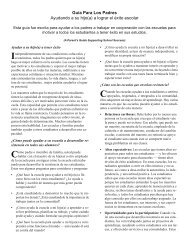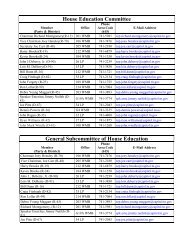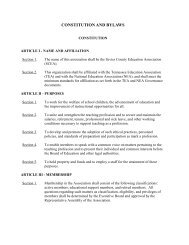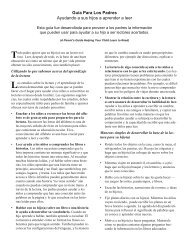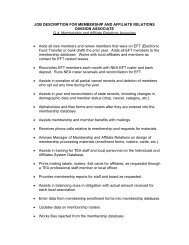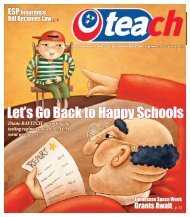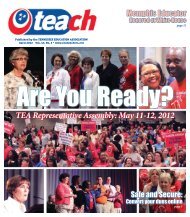February - Tennessee Education Association
February - Tennessee Education Association
February - Tennessee Education Association
You also want an ePaper? Increase the reach of your titles
YUMPU automatically turns print PDFs into web optimized ePapers that Google loves.
Where Has All the Money Gone?<br />
By Melissa Brown<br />
As we prepare to file our taxes, comparing<br />
our effective tax rates with those of<br />
presidential candidates and high networth<br />
individuals, it’s quite easy to<br />
tune into the national conversation<br />
as corporate tax loopholes come<br />
under scrutiny. In discussions about the economy<br />
nationwide, we hear that the fiscal situation at home<br />
in <strong>Tennessee</strong> and with the federal budget are getting<br />
more dire. The growing income disparity further<br />
erodes the already shrinking middle class, pointing<br />
out the disproportionate burden being placed on<br />
working families. Meanwhile, corporations continue<br />
to exploit loopholes in the tax code and avoid shared<br />
responsibility. The analysis below is an attempt to<br />
answer the question: What is the impact of corporate<br />
tax loopholes?<br />
Lost State Revenue<br />
A December 2011 study by the Citizens for Tax Justice<br />
and the Institute on Taxation and Economic Policy<br />
reported on the state and local income tax payments of<br />
265 profitable Fortune 500 companies.<br />
The report focused on 265 Fortune 500 companies<br />
that fully disclosed their tax payments, finding the<br />
following:<br />
• 68 companies paid no state income tax at all in<br />
at least one year from 2008 through 2010 and 16 of these<br />
companies had multiple no-tax years.<br />
• In 2009, 32 companies paid no state income tax.<br />
• The corporations were able to avoid a total of<br />
$42.7 billion in state corporate income taxes from 2008<br />
through 2010. U.S. profits totaling $1.33 trillion were<br />
reported to shareholders. Paying the 6.2 percent average<br />
state corporate tax rate, the corporations would have<br />
paid $82.6 billion in state corporate income taxes over<br />
the 2008-10 period. Instead, they paid only $39.9 billion.<br />
The companies used in the study operate throughout<br />
the United States. However, these companies do not<br />
disclose profits and taxes on a state-by-state basis, so<br />
the findings do not show conclusively whether specific<br />
companies paid any income tax in specific states.<br />
The Nelson A. Rockefeller Institute of Government<br />
reports that corporate income taxes make up only 5.7<br />
percent of state revenues, which is down from 9.7 percent<br />
in 1980.<br />
Lost Federal Revenue<br />
A November 2011 report by the National <strong>Education</strong><br />
<strong>Association</strong> noted that $222.7 billion of federal revenue<br />
was lost for years 2008 through 2010 due to corporate<br />
tax avoidance. A total of $9.8 billion could have gone to<br />
public schools and colleges nationwide.<br />
How did this affect education funding in <strong>Tennessee</strong>?<br />
The scenarios below describe how the lost revenues could<br />
have been used to improve our society and potentially<br />
boost the economy.<br />
Lost Federal Dollars for <strong>Education</strong> and Other Aid<br />
• $200 million in lost federal dollars for education<br />
• Dollars would have supported 2,859 education jobs<br />
• $1,500 lost federal dollars for Other Grants to State<br />
and Localities.<br />
Lost Federal Dollars for Title I Grants<br />
• Would have provided $180 million in grant dollars<br />
that would have benefited 205,296 students in poverty<br />
• Average funding lost per student in poverty: $878.<br />
Lost Federal Dollars for Special <strong>Education</strong><br />
• $200 million in lost grant dollars that would have<br />
benefited 119,455 students with disabilities.<br />
Lost Federal Dollars for Pell Grants<br />
• $191 million that would have benefited 148,462<br />
students in need<br />
• Average dollars lost per student in need: $1,286.<br />
Lost Federal Dollars for Head Start<br />
• $170 million in grant dollars that would have<br />
benefited 8,060 additional children in poverty who would<br />
have been enrolled in a Head Start program.<br />
Clearly, the amount of lost state and federal revenues<br />
due to corporate tax avoidance is significant.<br />
The amount of lost federal dollars alone could<br />
have funded or expanded programs for <strong>Tennessee</strong>’s<br />
children, expanded existing services and provided<br />
education positions for some of <strong>Tennessee</strong>’s 9.1 percent<br />
unemployed, based on the <strong>Tennessee</strong> Department of<br />
Labor and Workforce Development November 2011<br />
unemployment rate. At a time when the state continues<br />
its efforts to rebound from the Great Recession, budget<br />
revenues lost through corporate tax avoidance would not<br />
have been a luxury. According to experts who worked on<br />
many taxation studies, a fair tax burden is a necessity<br />
in funding education more appropriately, providing jobs<br />
and lessening the tax burden on the average working<br />
family.<br />
Melissa Brown is TEA manager of research.<br />
Stockpiled, Snow Days<br />
Rules Unchanged This Year<br />
Are school systems still allowed to use<br />
stockpiled days for snow days? TEA received a<br />
number of inquiries from teachers as to whether<br />
the State Department of <strong>Education</strong> has changed<br />
its policy on the use of stockpiled days for<br />
snow days. The Commissioner of <strong>Education</strong> has<br />
released the following statement in response to<br />
these inquiries:<br />
“State law allows school systems to stockpile<br />
up to 13 days by increasing the school day up to<br />
30 minutes and to use this excess time to make<br />
up for instruction missed due to dangerous or<br />
extreme weather conditions, such as snow. No<br />
approval is required from the commissioner<br />
provided the excess time is used for this purpose.<br />
Any school system that has adopted a school<br />
calendar with stockpiled days will be able to use<br />
that excess time for snow as it has in the past.<br />
“State law requires the approval of the<br />
commissioner if:<br />
1. A school system is using stockpiled<br />
days for other limited purposes outlined in the<br />
law—natural disasters, serious outbreaks of<br />
illness or dangerous structural or environmental<br />
conditions rendering a school unsafe for use; or<br />
2. Outright waiver of the 180-day<br />
instructional requirement in the event of a<br />
natural disaster or serious outbreak of illness.<br />
“For example, if a school system chose not<br />
to stockpile but then faced an illness outbreak<br />
where students missed a large number of days of<br />
instruction, it could apply to the commissioner<br />
for a waiver of the 180 day requirement.”<br />
Neither state law nor the State Department<br />
of <strong>Education</strong> has changed any law or policy<br />
regarding the use of stockpiled days for snow.<br />
Get Empowered, Connect<br />
At Minority Affairs Conference<br />
Mark your calendar and make plans to attend<br />
the Johnella Martin/TEA Statewide Minority<br />
Affairs Conference on March 23-24 at the<br />
DoubleTree Hotel in Chattanooga.<br />
Titled “Empowering and Connecting<br />
Educators to Meet Challenges, Today and<br />
Tomorrow,” the conference promises an exciting<br />
lineup of speakers and workshops. Registration<br />
deadline is March 12.<br />
Panelists Mary Mancini, <strong>Tennessee</strong> Sen. Jim Kyle, Sen. Andy Berke and Rep. Joe Pitts.<br />
How to Fix Our Economy<br />
Experts suggest strategies, question<br />
state use of incentives to business<br />
It may not be obvious when one enters the state<br />
legislature these days, but <strong>Tennessee</strong> has viable<br />
options as it tries to get its fiscal house in order.<br />
“Right here in the state legislature, when a bill<br />
is introduced, it seems the first question that gets<br />
asked is whether it’s good for business. The fair<br />
approach is to ask whether it’s good for the people<br />
of <strong>Tennessee</strong>,” said Mary Mancini of the <strong>Tennessee</strong><br />
Citizen Action organization during the Jobs and<br />
the Economy Summit held at the end of last year in<br />
Nashville.<br />
Panelists and attendees agreed that education<br />
funding is the foundation of economic prosperity in<br />
<strong>Tennessee</strong>.<br />
“<strong>Education</strong> is a primary economic driver for<br />
the state and its localities,” said Matthew Murray,<br />
professor at the University of <strong>Tennessee</strong> Center<br />
for Business and Economic Research. “<strong>Education</strong><br />
also creates important spillover benefits, such as<br />
increased longevity, lower infant mortality rates,<br />
more volunteerism and higher voting rates.”<br />
But current trends suggest that the focus in<br />
<strong>Tennessee</strong> has been elsewhere. With <strong>Tennessee</strong>’s<br />
unemployment rate hovering above the national<br />
average at 9.6 percent, and per-capita income<br />
growth of only 60 cents a year during the last 10<br />
years (in inflation-adjusted figures), it is clear that<br />
the economic engine needs adjusting. The gap<br />
between the poorest and wealthiest Tennesseans<br />
keeps growing wider. In fact, the state now ranks<br />
fifth in the nation in terms of wealth disparity,<br />
according to Michael Kahn, associate director of<br />
finance and economics at NEA.<br />
“Currently in <strong>Tennessee</strong>, tax structures are<br />
out of sync with the economy, and school funding<br />
is inadequate and inequitable. Schools lack the<br />
capacity to do their jobs, but teachers are being<br />
held accountable for student outcomes,” said Kahn.<br />
“These trends undermine our future economic<br />
prosperity.”<br />
To solve the state’s fiscal problems, Kahn<br />
suggested ensuring adequate and equitable<br />
funding for public education through a system of<br />
revenues that involves a level playing field for all<br />
businesses, large and small. “Above all, if we want<br />
to keep our economic edge in the knowledge-based<br />
global economy, we must make investment in public<br />
education our top priority,” he said.<br />
To the obvious argument that there is no<br />
money, Kahn questioned <strong>Tennessee</strong>’s current use of<br />
the so-called economic development subsidies to<br />
corporations. When the state of <strong>Tennessee</strong> offered<br />
$577 million in subsidies to lure the Volkswagen<br />
plant to Hamilton County, Kahn said the lost<br />
revenue could have been spent more wisely. Under<br />
the VW agreement, the city of Chattanooga and<br />
Hamilton Co. will forego $200 million in property<br />
tax collections for 30 years, and that’s just one<br />
example of the myriad subsidies being doled out by<br />
state and local officials to businesses every year.<br />
At the same time, education funding in <strong>Tennessee</strong><br />
is now less than it was in 1970, and teacher salaries<br />
remain largely unchanged over the last 20 years,<br />
said Kahn.<br />
Adding another item to the economic<br />
prosperity wish list, Murray questioned the lack of<br />
transparency in tax increment financing currently<br />
used by localities for new economic development.<br />
“TIF financing likely does more to reallocate<br />
economic activity than create new activity,” he<br />
said. “TIFs may also divert funds from schools to<br />
financing of new development.”<br />
While offering a solution, Kahn invoked the<br />
name of billionaire investor Warren Buffett, the<br />
champion of fair taxation among the wealthy.<br />
“Just imagine the top one percent of income<br />
earners in <strong>Tennessee</strong> with an annual income of<br />
about $1.3 million paying at the same effective<br />
rate as the bottom 20 percent,” he said. “It would<br />
generate $2.2 billion—enough to wipe out the<br />
adequacy gap and fix the structural deficit.”<br />
Such measures may cause pro-business hawks<br />
to cry foul, but Kahn insisted that they won’t hurt<br />
small business because, according to IRS data, only<br />
2 percent of small business owners make more than<br />
$250,000 a year.<br />
“As China doubles its investment in education,<br />
no politician should be able to get away with saying<br />
that they care about our state’s and country’s<br />
future while shortchanging education,” said Jerry<br />
Winters, TEA manager of government relations,<br />
who attended the conference.<br />
More than 96% of<br />
TEA Dues Qualifies<br />
For IRS Tax Deduction<br />
The portion of TEA dues expended<br />
for government relations activities for<br />
2010/2011 is 3.82 percent.<br />
TEA members can deduct 96.18 percent<br />
of their dues for IRS income tax purposes.<br />
TEA provides a pass-through procedure<br />
whereby members contribute to TEA-FCPE<br />
(<strong>Tennessee</strong> <strong>Education</strong> <strong>Association</strong> Fund for<br />
Children and Public <strong>Education</strong>).<br />
The amount of TEA-FCPE pass-through<br />
for the current year is $4.41 per active<br />
member and $2.21 per ESP staff member.<br />
Members who do not desire to<br />
participate may divert these funds to other<br />
government relations activities — such as<br />
promotion of the TEA legislative program<br />
and lobbying — by completing and mailing<br />
the accompanying form, postmarked no<br />
later than April 10, 2012.<br />
I request that the portion of my dues eligible<br />
to be passed through to TEA-FCPE be used in<br />
other TEA Government Relations activities.<br />
Name (please print)<br />
4 <strong>February</strong> 2012 For details, visit www.teateachers.org.<br />
5<br />
Address<br />
City State ZIP<br />
Social Security Number<br />
Active Member<br />
School System<br />
Signature<br />
<strong>Education</strong> Support Professional<br />
Student Member<br />
Mail to: <strong>Tennessee</strong> <strong>Education</strong> <strong>Association</strong>,<br />
801 Second Avenue North, Nashville, TN<br />
37201-1099. (This form must be postmarked or<br />
received no later than April 10, 2012.)<br />
www.teateachers.org




